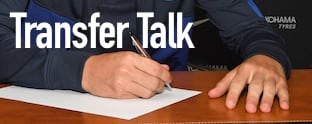When Park Ji-Sung arrived at Manchester United in the summer of 2005 for £4m from PSV Eindhoven, he did so with an already growing reputation.
The midfielder was a favourite of Guus Hiddink, who had coached him at the 2002 World Cup with South Korea - where he scored the goal against Portugal that saw his nation qualify for the knockout stages - and then taken him to PSV in 2003.
It was during the 2004-05 campaign that he really shone in the Netherlands, scoring 11 goals in all competitions, including one in PSV's victory over AC Milan in the first leg of that season's Champions League semi-final. The Italian club would eventually advance through to the final with a 2-0 win back at the San Siro, but Park's ability was on the radar of a number of European clubs.
It prompted a swift reaction from then United manager Sir Alex Ferguson, who made Park the first South Korean to play in the Premier League.

He scored just two goals during his first year at Old Trafford (including one against Arsenal, who would frequently suffer at the hands of Park), but it was his effort and stamina that made him an instant hit with the United fans.
Dubbed 'Three-lung Park' by supporters, his debut season would end with success in the League Cup as United defeated Wigan Athletic 4-0 in the final at the Millennium Stadium in Cardiff.
A year later, and despite suffering with a knee injury, Park still featured in enough matches to claim a medal as the Red Devils wrestled the Premier League title away from Jose Mourinho and Chelsea. He also netted five goals that term, including a brace against Bolton Wanderers.

United retained the title a year later and reached the final of the 2008 Champions League in Moscow, thanks to wins over Roma and Barcelona in the quarter-finals and semi-finals respectively. Park played every minute of those four encounters, covering 12km during the second leg against Barca.
On a personal level, the final would actually be one of the lowest moments of Park's United career. Despite his importance in the previous rounds, Ferguson could not find a place for him in the squad to face Chelsea that night - a decision that the Scot later described as one of the hardest that he ever had to make. So, while his teammates prepared to head out onto the Luzhniki Stadium pitch, Park was left in his grey suit.
The Korean media, who followed Park's every move at United, later branded his absence the "Moscow nightmare", but the player himself was more philosophical as his team won on penalties in the Russian rain: "The team won so I am happy. Personally it is frustrating not to play in such a big game. But there will be other opportunities."
He would only have to wait another 12 months for one of those "other opportunities" when United reached the final again. However, despite Park's presence, the Red Devils slumped to a 2-0 defeat at the hands of a Lionel Messi-inspired Barcelona in Rome. It was a scant consolation, but Park had become the first player from his nation to feature in a Champions League final, much to the delight of fans in his homeland.
Now a well-established member of the United squad, Park was handed a second chance to get his hands on the big trophy in 2011 at Wembley, but once again Barca haunted United with a 3-1 victory. During both of those runs to the final, Park had displayed a real knack of scoring important goals. He netted against Arsenal in the 2009 semi-finals and in the last eight against Chelsea on the road to Wembley.
What's more, despite the two defeats, Park still had plenty to show for his time at United. He won the Premier League on four occasions, three League Cups, two Community Shields and a FIFA World Club Cup.
By the time the summer of 2012 had come around, it had become clear that Park would find it hard to force his way into Ferguson's team on a regular basis and so after 205 outings in a red shirt and 27 goals, he was transferred to Queens Park Rangers, who had been flashing the cash.
The Londoners struggled from the outset, though, losing 5-0 at home to Swansea City on Park's competitive debut at Loftus Road. It was a sign of things to come and they were eventually relegated to the Championship, with Park having made 25 appearances in all competitions.
With QPR said to be keen to ease their wage bill as a consequence of the demotion, Park is now believed to be on the verge of returning to where it all started for him in European football. He will do so having made a lasting impression in England.











